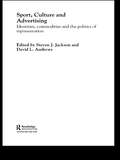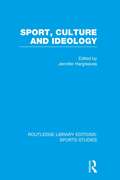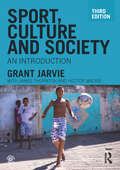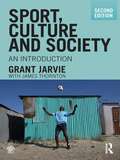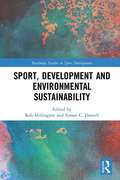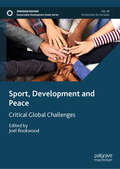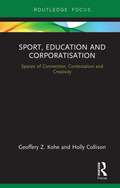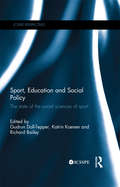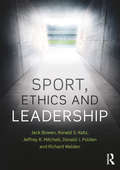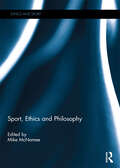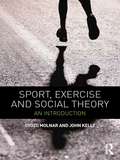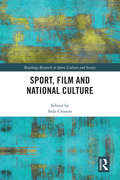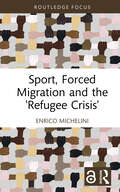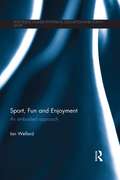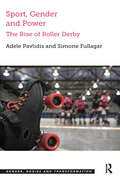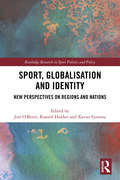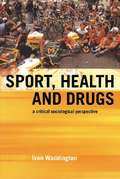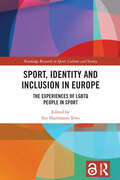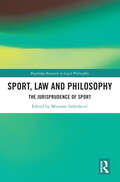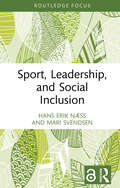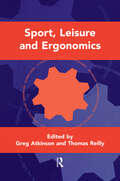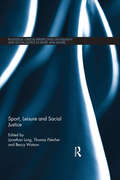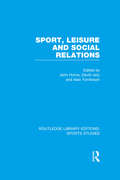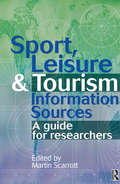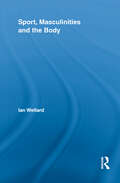- Table View
- List View
Sport, Culture and Advertising: Identities, Commodities and the Politics of Representation
by David L. Andrews Steven J. JacksonDespite the range of theoretical and methological positions adopted and the wide range of issues and topics related to advertising covered by cultural studies, relationships between sport and advertising have been largely overlooked.Given its gobal popularity and its prevalence across the spectrum of cultural and commercial life it is not surprising that scholars interrogating the cultural politics of sport have begun to recognise advertising as an important site for the analysis of power relations, cultural politics and cultural repesentation. Sport, Culture and Advertising presents a first step towards understanding the relationship between advertising and identity with a focus on sport. The book will be useful for scholars across a range of disciplines and will be of interest to students looking for a more critical examination of the commercial realm of sport.
Sport, Culture and Ideology (Routledge Library Editions: Sports Studies)
by Jennifer HargreavesSport celebrates basic human values of freedom, justice and courage. This collection of essays probes beneath those assumptions in order to illuminate how sport is intimately related to power and domination. Topics include the media treatment of sport, drug-taking in sport and the controversial and problematic relationship between sport and politics in Russia and South Africa.
Sport, Culture and Society: An Introduction
by Grant JarvieWhat can sport do to produce social change in our world today? It is impossible to fully understand contemporary society and culture without acknowledging the importance of sport. Sport is part of our social and cultural fabric, possessing a commercial power that makes it a potent force in the world, for good and for bad. It has helped to start wars and promote international reconciliation, and governments around the world commit public resources to sport. Sport matters, but how should you make sense of what is going on in the world of sport today? Now in a fully revised, updated and expanded third edition, this critical, challenging and comprehensive textbook introduces the study of sport, culture and society. International in scope, it challenges us to reactivate an audacious spirit of activism through sport. Full of contemporary examples, it places sport at the heart of the analysis and introduces the reader to every core topic and emerging area in the study of sport and society, including: the history and politics of sport; sport, gender and sexuality; sport, disability and advocacy; sport, race and racism; sport, violence and crime; sport and health; sport, globalisation and democracy; sport, media and cultural relations; sport and the environment; sporting cities and mega-events; sport, poverty and development. Each chapter includes a wealth of useful features, including Sport in Focus case studies, chapter summaries, guides to further reading, revision questions, practical projects, definitions of key concepts and weblinks. Additional teaching and learning resources – including a testbank, resource list and glossary – are available on a companion website. Sport, Culture and Society is the most broad-ranging, in-depth and thoughtful introduction to the sociocultural analysis of sport currently available and sets a new agenda for the discipline. It is essential reading for all students with an interest in sport.
Sport, Culture and Society: An Introduction, second edition
by Grant JarvieIt is impossible to fully understand contemporary society and culture without acknowledging the place of sport. Sport is part of our social and cultural fabric, possessing a social and commercial power that makes it a potent force in the world, for good and for bad. Sport has helped to start wars and promote international reconciliation, while every government around the world commits public resources to sport because of its perceived benefits. From the bleachers to the boardroom, sport matters. Now available in a fully revised and updated new edition, this exciting, comprehensive and accessible textbook introduces the study of sport, culture and society. International in scope, the book explores the key social theories that shape our understanding of sport as a social phenomenon and critically examines many of the assumptions that underpin that understanding. Placing sport at the very heart of the analysis, and including vibrant sporting examples throughout, the book introduces the student to every core topic and emerging area in the study of sport and society, including: the history and politics of sport sport and globalization sport and the media sport, violence and crime sport, the body and health sport and the environment alternative sports and lifestyles sporting mega-events sport and development. Each chapter includes a wealth of useful features to assist the student, including chapter summaries, highlighted definitions of key terms, practical projects, revision questions, boxed case-studies and biographies, and guides to further reading, with additional teaching and learning resources available on a companion website. Sport, Culture and Society is the most broad-ranging and thoughtful introduction to the socio-cultural analysis of sport currently available and sets a new agenda for the discipline. It is essential reading for all students with an interest in sport. Visit the companion website at www. routledge. com/cw/jarvie.
Sport, Development and Environmental Sustainability (Routledge Studies in Sport Development)
by Simon C. Darnell Rob MillingtonThis is the first book to consider the intersections of sport, international development and environmental sustainability. It explores the tensions between sport’s potential contribution to the environment and its rather poor record to date. Bringing together a diverse group of scholars who approach the topic from various disciplinary and theoretical perspectives, the book provides both critical and optimistic perspectives on the place of sport in sustainable development. Chapters examine and question how and whether sport contributes to sustainable development on an international scale. Attention is also paid to the place and role of Indigenous knowledge in sustainable Sport for Development, particularly as an alternative to modernization and/or in support of reconciliation with Indigenous peoples. Sport, Development and Environmental Sustainability is important reading for academic researchers, students and policy-makers in the fields of kinesiology, sport studies, sport sociology, leisure studies, sport management, sport media, physical cultural studies, environmental studies and sustainability and international development studies.
Sport, Development and Peace: Critical Global Challenges (Sustainable Development Goals Series)
by Joel RookwoodThis volume offers a comprehensive exploration of the rapidly evolving landscape of Sport for Development and Peace (SDP), a critical approach to peacebuilding, economic development, and social transformation gaining increasing stature during the last twenty-five years. Contributors here scrutinize the diversification in SDP methods and ideals, spotlighting global dimensions and differences in this burgeoning field. Encompassing contributions from scholars across five continents, the chapters illuminate diverse approaches and analyses, reflecting a variety of viewpoints and experiences. The volume highlights the heterogeneity within SDP and assesses the trajectory of SDP studies, while also identifying common threads among seemingly disparate approaches. Further, it investigates sport's role in responding to global challenges, from financial crises to the COVID-19 pandemic, climate change, and conflicts, and although sport is often recognized for its potential to foster peace and development, this book navigates the intricate complexities and contradictions that can arise in the practice of harnessing sport for these goals. With 14 engaging chapters, the book delves into a range of topics, including critical analyses of different SDP approaches, the sustainability of sport initiatives, alignment of SDP with sustainable development goals, and the use of sport in refugee resettlement. It also examines sport's contribution to societal outcomes like health, education, inequality reduction, and peace, while discussing challenges faced in the field. Moreover, the volume explores the connections between SDP and indigenous philosophies, feminism, local community development, and issues of violence within prisons. Offering a holistic view of SDP's evolution and impact, presenting fresh perspectives as well as critical insights for scholars, practitioners, and policymakers in the realm of international sport, development, and peacebuilding, this volume marks itself an essential resource for understanding the multifaceted landscape of SDP.
Sport, Education and Corporatisation: Spaces of Connection, Contestation and Creativity (Routledge Focus on Sport, Culture and Society)
by Holly Collison Geoffery Z. KoheUsing an interdisciplinary approach, Sport, Education and Corporatisation offers an important critique of the intersection between sport organisations, commercial agendas and educational development. It reveals a discomforting interplay between sector stakeholders that has been normalised via discourses of civic ‘good’, social responsibility and community welfare. The book employs stakeholder theory, corporate social responsibility ideals, and holistic constructions of space to provide a framework to understand some of the latent and explicit complexities of sport sector connectivity. Interrogating the key contexts, issues and challenges that emerge from the Sport-Education-Corporate nexus and drawing upon evidence from international, national and local sport organisations, it argues for sustained and rigorous examination of the commercialisation of educational agendas and new directions for education-based corporate social responsibility within the sport industry. This is an invaluable resource for researchers working in the areas of sport management; sport development; sociology of sport; sport policy and politics; physical education; and the wider economics, organisational politics and business ethics fields. It is also a fascinating read for students within sport business management, sports studies, sport politics and physical education programmes.
Sport, Education and Social Policy: The state of the social sciences of sport (ICSSPE Perspectives)
by Richard Bailey Gudrun Doll-Tepper Katrin KoenenThis important study brings together world-leading researchers to reflect upon the state of the social scientific study of sport. Addressing three core themes in sport studies – equality, education and policy – the book looks back over the development of sport research in recent decades and offers new insights into future lines of enquiry. Presenting a unique collection of authoritative perspectives from some of the best-known scholars in the social scientific study of sport, the book engages with key contemporary issues such as gender stereotypes in physical education, ethnicity, inclusion and critical race theory, physical literacy, physical activity and health, and international sport governance. Its chapters address major topics such as the globalisation of physical activity initiatives and the involvement of the EU in developing sport policies, as well as shedding light on new areas of research such as the growing participation of Muslim women in sport. Sport, Education and Social Policy: The state of the social sciences of sport is fascinating reading for any researcher or advanced student working in sport studies, physical education or kinesiology.
Sport, Ethics and Leadership
by Jack Bowen Donald J. Polden Jeffrey R. Mitchell Richard Walden Ronald S. KatzEverybody involved in sport, from the bleachers to the boardroom, should develop an understanding of ethics. Sport ethics prompt discussion of the central principles and ideals by which we all live our lives, and effective leadership in sport is invariably ethical leadership. This fascinating new introduction to sport ethics outlines key ethical theories in the context of sport as well as the fundamentals of moral reasoning. It explores all the central ethical issues in contemporary sport: from violence, hazing, and gambling to performance enhancement, doping, and discrimination. This book not only investigates the ethical, social, and legal underpinnings of the most important issues in sport today, but also introduces the reader to the foundations of ethical leadership in sport and discusses which leadership strategies are most effective. Each chapter includes original real-world case studies, learning exercises, and questions to encourage students to reflect on the ethical problems presented. Sport, Ethics and Leadership is an essential resource for any course on sport and leisure studies, the ethics and philosophy of sport, or sport and leisure management.
Sport, Ethics and Philosophy (Ethics and Sport)
by Mike McNameeThis book represents a bold statement concerning the excitement and energy of the field of sports ethics and philosophy in contemporary terms. It is comprised of a collection of commissioned essays from the leading international scholars in the field to celebrate the ten year editorship of Mike McNamee for the journal: Sport, Ethics and Philosophy. The collection includes essays familiar sport philosophers on work about the nature and nuances of sports and games playing, winning and losing, role models and strategic fouling. It also celebrates in phenomenological terms the complex and heterogeneous experience and values of sports in both phenomenological and analytic modes. Finally, it addresses the most serious threats to sport integrity and governance, in the shape of doping, and the unchecked power of sports institutions, and the charisma of sport that is at the mercy of commercialism. This book was originally published as a special issue of Sport, Ethics and Philosophy.
Sport, Exercise and Social Theory: An Introduction
by John Kelly Gyozo MolnarWhy are sport and exercise important? What can the study of sport and exercise tell us about wider society? Who holds the power in creating contemporary sport and exercise discourses? It is impossible to properly understand the role that sport and exercise play in contemporary society without knowing a little social theory. It is social theory that provides the vocabulary for our study of society, that helps us ask the right critical questions and that encourages us to look for the (real) story behind sport and exercise. Sport, Exercise and Social Theory is a concise and engaging introduction to the key theories that underpin the study of sport, exercise and society, including feminism, post-modernism, (Neo-)Marxism and the sociological imagination. Using vivid examples and descriptions of sport-related events and exercise practices, the book explains why social theories are important as well as how to use them, giving students the tools to navigate with confidence through any course in the sociology of sport and exercise. This book shows how theory can be used to debunk many of our traditional assumptions about sport and exercise and how they can be a useful window through which to observe wider society. Designed to be used by students who have never studied sociology before, and including a whole chapter on the practical application of social theory to their own study, it provides training in critical thinking and helps students to develop intellectual skills which will serve them throughout their professional and personal lives.
Sport, Film and National Culture (Routledge Research in Sport, Culture and Society)
by Seán CrossonSport and film have historically been key components of national cultures and societies. This is the first collection dedicated to examining the intersection of these popular cultural forces within specific national contexts. Covering films of all types, from Hollywood blockbusters to regional documentaries and newsreels, the book considers how filmic depictions of sport have configured and informed distinctive national cultures, societies and identities. Featuring case studies from 11 national contexts across 6 continents – including North and South America, Europe, Africa, Asia and Oceania – it reveals the common and contrasting approaches that have emerged within sport cinema in differing national contexts. This is fascinating and important reading for all students and researchers working in film, media, cultural studies or sport, and for broader enthusiasts of both sport and film.
Sport, Forced Migration and the 'Refugee Crisis' (Routledge Focus on Sport, Culture and Society)
by Enrico MicheliniDrawing on original research, this book looks at what sport can tell us about the social processes, patterns and outcomes of forced migration and the &‘refugee crisis&’. Adopting a systems theory framework and examining different sport disciplines, performance levels and settings, it represents a significant contribution to our understanding of one of the most urgent social issues facing the modern world. The book explores four key aspects of sport&’s intersection with forced migration. Firstly, it looks at how the media covers sport in relation to the &‘refugee crisis&’, specifically coverage of refugee elite athletes. Secondly, it examines the adaptation of sport organisations to the &‘refugee crisis&’, including the culture, programmes and structures that promote or obstruct sport for refugees. Thirdly, the book looks at sport in refugee sites, and how sport can be used as therapy, an escape or empowerment for refugees but also how it can reinforce the divisions between staff and the refugees themselves. Finally, the book looks at how forced migration influences and is influenced by participation in elite sport, by examining the biographies of elite migrant athletes. A richly descriptive, critical and illuminating piece of work, this book is fascinating reading for anybody with an interest in sport, migration, sociology or the relationship between sport and wider society.
Sport, Fun and Enjoyment: An Embodied Approach (Routledge Studies in Physical Education and Youth Sport)
by Ian WellardSport, Fun and Enjoyment explores the pleasurable aspects of sport within the context of everyday recreational and competitive physical activities. While much recent work has focused on the relationships between physical activity, health and wellbeing, much less attention has been paid to pleasure and fun, key aspects of our engagement with sport but not so easy to measure in terms of specific outcomes. By offering a critical exploration of what can be constituted as ‘fun’ in a sporting context, this book reveals the complex ways in which individuals approach sport and engage with it throughout the life course. The book considers the importance of pleasure and fun as a factor in our initial, formative experiences of sport activity, and as a factor in participation and continued participation. It explores the nature of fun as an embodied experience which incorporates a multitude of social, psychological and physiological components, and as a subjective experience which cannot be fully explained through simplistic binary formulations of pleasure and pain. Drawing on a wide research literature and original empirical research with children and adults, the book outlines a new theoretical framework for thinking about pleasure and fun in sport, highlighting the contrasting ways in which sport and physical activity is experienced and the interplay between individual and social contexts. Sport, Fun and Enjoyment is important reading for anybody with an interest in physical education, youth sport, the sociology of sport, physical activity and health, sport development or sport policy.
Sport, Gender and Power: The Rise of Roller Derby (Gender, Bodies and Transformation)
by Simone Fullagar Adele PavlidisAs a new breed of lifestyle sport enthusiasts ’derby grrrls’ are pushing the boundaries of gender as they negotiate the nexus of pleasure, pain and power relations. Offering a socio-cultural analysis of the rise and reinvention of roller derby as both a new, globalized women’s sport and an everyday creative leisure space, this book explores the manner in which roller derby has emerged as a gendered space for self-transformation, belonging and embodied contest, in which women are invited to experience their emotions differently, embrace pain and overcome limits. Sport, Gender and Power: The Rise of Roller Derby presents detailed interview, ethnographic and autoethnographic material, together with a range of media texts to shed new light on the complex relationships of power experienced by women in derby as a sport culture, whilst also examining the darker relationships that characterise the sport, including those of inclusion and exclusion, difference and identity, and competition and participation. A contemporary feminist study of empowerment, sexual difference, gender and affect, this book will appeal to scholars of gender and sexuality, embodiment, feminist thought and the sociology of sport and leisure.
Sport, Globalisation and Identity: New Perspectives on Regions and Nations (Routledge Research in Sport Politics and Policy)
by Jim O'Brien Russell Holden Xavier GinestaSport can be a vehicle for the expression of identity, and also a factor in the shaping of identity. This book explores the complex interrelationships between nations, regions and states in the landscape of contemporary international sport, with a particular focus on identity. Exploring important themes such as the geopolitics of sports events, contested identities, and ownership of sport and its impact on sporting cultures, the book presents contemporary and historical cases from around the world, including football in a divided Ireland; sport and the anti-Apartheid movement; Chinese sporting nationalism and soft power; and the role of sport media in the shaping of Catalan identity. This is an important resource for students and researchers working in Sports Studies, Sports Journalism, Sports Management Studies, Sports Marketing, Football Studies, Sport and Identity Studies, Sociology of Sport Studies, and Cultural Studies.
Sport, Health and Drugs: A Critical Sociological Perspective
by Andy Smith Ivan WaddingtonWhy do many athletes risk their careers by taking performance enhancing drugs? Do the highly competitive pressures elite sports teach athletes to win at any cost? In order to understand the complex relationships between sport and other aspects of society, it is necessary to strip away our preconceptions of what sport is, and to examine, in as detached a manner as possible, the way in which the world of sport actually functions. This fully updated edition of Ivan Waddington’s classic introduction to drugs in sport examines the key terms and key issues in sport, drugs and performance and is designed to help new students explore these controversial subjects, now so central to the study of modern sport. The book addresses topics such as: the emergence of drugs in sport and changing patterns of use the development of an objective, sociological understanding sports law, policy and administration WADA, NGB’s and the sporting federations case studies of football and cycling the case of sports medicine. An Introduction to Drugs in Sport: Addicted to Winning is a landmark work in sports studies. Using interview transcripts, case studies and press cuttings to ground theory in reality, students and lecturers alike will find this an immensely readable and enriching resource.
Sport, Identity and Inclusion in Europe: The Experiences of LGBTQ People in Sport (Routledge Research in Sport, Culture and Society)
by Ilse Hartmann-TewsThis book explores and critically assesses the challenges and experiences of LGBTQ people within sport in Europe. It presents cutting-edge research data and insights from across the continent, with a focus on sport policy, sport systems, and issues around anti-discrimination and inclusion. The book introduces the theoretical and methodological foundations of research into LGBTQ people in sport and then presents in-depth comparative surveys of systems and experiences in Austria, Belgium, France, Germany, Hungary, Italy, the UK, and Spain. A final section considers the effectiveness of policy in this area and motives for participation, and looks ahead at future directions in research, policy, and practice. Tracing the frontiers of our understanding of the experiences of LGBTQ people in contemporary Europe, this is fascinating reading for anybody with an interest in the sociology of sport, sport policy, LGBTQI studies, gender and sexuality studies, or cultural studies.
Sport, Law and Philosophy: The Jurisprudence of Sport (Routledge Research in Legal Philosophy)
by Miroslav ImbriševićSport, Law and Philosophy: The Jurisprudence of Sport discusses the intersection of law and sport and highlights its usefulness to both legal scholars and philosophers of sport. There is a general recognition that law and sports bear strong similarities. Both can be understood as systems of rules, with a judge/referee who has the power to adjudicate and to issue punishments/penalties. Divided into two parts, this volume presents an exploration of central philosophical issues arising from the intersections of law and sport and makes reference to current events and controversies. Experts from across the globe discuss a range of issues such as sports as legal systems, the game as a social contract, the role of the referee, including VAR, rule breaking, equality in women’s sport, justice on the sports field and in the court room, and issues surrounding the application of law to sports. The book will be a valuable resource to Undergraduates, Postgraduates and for those working in the areas of legal philosophy, sports law, and philosophy of sport.
Sport, Leadership, and Social Inclusion (Routledge Focus on Sport, Culture and Society)
by Hans Erik Næss Mari SvendsenThis book considers how sport organizations can create inclusive practices to strengthen social progress, focusing on the importance of leadership in fostering positive change.Drawing on original research, and adopting a meso-level, multi-disciplinary approach that includes perspectives from sport management, the sociology of sport and organizational psychology, the book considers the evidence for sport as a vector of social progress. Featuring qualitative interviews with non-profit sport leaders from organizations across Europe, the book looks at the conditions under which social inclusion through sport is possible and examines the challenges and opportunities related to three areas of inclusivity and exclusivity: access, participation, and empowerment.Offering a new perspective on how leadership can help unlock the potential of sport as an inclusive force in society, this book is an important read for anybody with an interest in sport development, sport management, social inclusion, or the relationship between sport and wider society.
Sport, Leisure and Ergonomics
by Greg Atkinson Thomas ReillyThe field of sports ergonomics is now recognised as an interdisciplinary area in its own right. This book forms the proceedings of the 3rd International Conference on Sport, Leisure and Ergonomics, providing a particular focus on disabled athletes, health and fitness educations and sports equipment.
Sport, Leisure and Social Justice (Routledge Critical Perspectives on Equality and Social Justice in Sport and Leisure)
by Jonathan Long Beccy Watson Thomas FletcherSocial inequalities are often reproduced in sport and leisure contexts. However, sport and leisure can be sites of resistance as well as oppression; they can be repressive or promote positive social change. This challenging and important book brings together contemporary cases examining different dimensions of inequality in sport and leisure, ranging from race and ethnicity to gender, sexual orientation, disability, religion and class. Presenting research-based strategies in support of social justice, this book places the experiences of disadvantaged communities centre stage. It addresses issues affecting participation, inclusion and engagement in sport, while discussing the challenges faced by specific groups such as Muslim women and LGBT young people. Including original theoretical and methodological insights, it argues that the experiences of these marginalised groups can shed a light on the political struggles taking place over the significance of sport and leisure in society today. Sport, Leisure and Social Justice is fascinating reading for students and academics with an interest in sport and politics, sport and social problems, gender studies, race and ethnicity studies, or the sociology of sport.
Sport, Leisure and Social Relations (Routledge Library Editions: Sports Studies)
by John Horne David Jary Alan TomlinsonWhen this book was first published the study of sport had been largely neglected by sociologists. The contributions to this volume bring the sports field, the leisure centre and everyday leisure activities to a more central position within the sociological enterprise. Whether amateur or professional, sport contributes to wider relations of power, privilege and domination and this debate represents an important phase in the sociology of sport and leisure.
Sport, Leisure and Tourism Information Sources
by Martin ScarrottSport, Leisure and Tourism is a practical guide to finding information, encouraging readers to make active use of libraries in their research. This book provides readers with an understanding of the major information search tools which are available. It is a starting point in the search for information which offers advice and indicates some of the major sources which are available. Sport, Leisure and Tourism Information Sources is aimed primarily at final year undergraduate and postgraduate students who are preparing a dissertation in the area of sport and leisure studies who need access to information sources. It is also ideal for academics for teaching purposes and practitioners in the sport and leisure industry needing to undertake research.
Sport, Masculinities and the Body (Routledge Research in Sport, Culture and Society)
by Ian WellardThis groundbreaking work explores masculinity and the body within sports. Sports continue to retain expectations for presentations of specific forms of masculinity. The body is central to these presentations. These everyday bodily performances are rehearsed and performed either successfully or unsuccessfully - and the consequences of these actions play a significant part in the ability of the individual to continue to take part. Through participant observations, sporting life-history interviews (with over forty men) and research with children, this book examines the ways in which 'appropriate' sporting masculinities are learned and enacted to varying degrees of success. Wellard highlights the social processes which impact upon individual constructions and formulations of masculine identity and reviews these in relation to broader debates on gender, embodiment and sporting participation. This book contributes not only to the academic fields of sport and gender, but also to the efforts to confront continued forms of 'accepted' gender discrimination.
